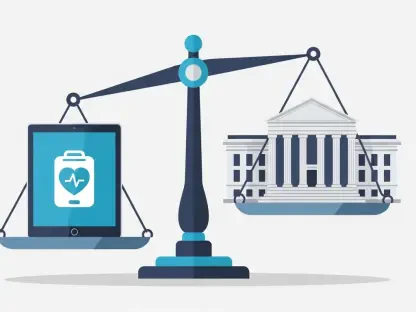The healthcare landscape is on the brink of a profound transformation, driven by rapid technological advancements, evolving societal needs, and shifting demographic patterns. By 2025, innovations in AI, remote medicine, and biotechnology are expected to revolutionize healthcare delivery, making it more personalized, efficient, and accessible. This article explores seven key trends that will shape the future of healthcare, highlighting the importance of preparation and adaptation to meet these changes effectively.
The Personalized Healthcare Revolution
Leveraging AI and Data for Tailored Care
Personalized healthcare in 2025 will extend beyond the current scope of precision medicine. By harnessing the power of AI and extensive data, healthcare providers will be able to cater to the unique needs of each patient. This approach will involve designing tailored wellness plans and communication strategies to engage different demographic groups, particularly those traditionally hard to reach. The goal is to shift from a reactive healthcare system to one that emphasizes preventative care, ultimately reducing costs and improving patient outcomes. By predicting health issues before they become severe, healthcare providers can offer proactive treatments and interventions designed specifically for each individual’s needs.
Rather than solely relying on general treatment protocols, AI-driven insights could determine the most effective strategies for preventing diseases, managing chronic conditions, and promoting overall well-being. This shift toward a preventative model is expected to be more cost-effective and beneficial for patients, who will receive care that is more closely aligned with their personal health profiles. In partnership with data analytics, AI will empower providers to make informed decisions and enhance the quality of care across the board.
Engaging Diverse Demographic Groups
The personalized approach will also focus on engaging diverse demographic groups, ensuring that healthcare services are inclusive and accessible. By utilizing AI-driven insights, healthcare providers can develop targeted interventions that address the specific needs of various populations. This will help bridge the gap in healthcare access and improve overall health outcomes for underserved communities. For instance, AI algorithms could identify trends and patterns in health data specific to minority groups, enabling the design of more effective outreach programs and treatment plans.
Additionally, personalized healthcare seeks to break down barriers that prevent certain populations from accessing quality care. This might involve creating more culturally sensitive care models, improving language accessibility, and using data to address specific health disparities. The aim is to create a more equitable healthcare system where everyone, regardless of their background or socioeconomic status, can receive high-quality, personalized care tailored to their unique needs and circumstances. By investing in these areas, healthcare providers can foster trust and engagement within diverse communities, who may otherwise be hesitant to seek out medical support.
Future-Proofing Healthcare
AI’s Role in Addressing Global Health Challenges
AI will play a crucial role in transforming how healthcare systems plan for and respond to large-scale challenges, such as pandemics, wars, famines, and climate-related health crises. By 2025, decision-makers will have unprecedented access to data and tools that provide essential insights into global health trends. This will enable healthcare providers to anticipate and mitigate future health crises, ensuring a more resilient healthcare system. The predictive capabilities of AI can help forecast potential outbreaks, allocate resources more effectively, and develop strategies for emergency response.
For instance, the integration of AI systems in public health surveillance can improve the speed and accuracy of detecting emerging threats. Healthcare providers can leverage AI to analyze vast datasets that include information on disease patterns, environmental factors, and population movements. This information will be crucial in formulating a robust response and preventing widespread health impacts. By staying ahead of potential crises, healthcare systems can implement targeted interventions, distribute vaccines and medications more efficiently, and coordinate cross-border collaborations to manage global health challenges.
Addressing Aging Populations and Rising Healthcare Demands
The use of AI and data analytics will be instrumental in addressing the specific needs of aging populations in developed countries and the rising healthcare demands in developing regions. By leveraging these technologies, healthcare providers can develop targeted strategies to manage the growing burden of chronic diseases and improve overall health outcomes. One key area where AI can make a difference is in the early detection and management of age-related conditions such as Alzheimer’s disease, diabetes, and cardiovascular illnesses.
Data analytics can help identify trends and risk factors associated with these conditions, allowing for earlier interventions that can slow progression and enhance quality of life for older adults. Similarly, in developing regions where resources may be limited, AI-driven tools can optimize the allocation of available medical supplies and personnel, ensuring that critical needs are met promptly. By analyzing healthcare usage patterns and predicting future demands, AI enables more efficient planning and resource distribution, ultimately leading to better health outcomes and greater resilience in healthcare systems worldwide.
Technology in Mental Wellness
Virtual Reality and Augmented Reality in Mental Health
Technological innovations are set to revolutionize mental healthcare delivery. Virtual reality (VR) and augmented reality (AR) will facilitate remote therapy sessions, making mental health services more accessible. These technologies will enable healthcare providers to offer immersive and interactive therapy experiences, improving patient engagement and outcomes. For instance, VR-based exposure therapy can help patients confront and manage phobias or traumatic experiences in a controlled and safe environment, which is especially beneficial for those who may find it difficult to attend in-person sessions.
Furthermore, VR and AR can enhance therapeutic experiences by recreating specific scenarios or environments that are crucial for treatment purposes. This level of immersion can lead to more effective therapeutic outcomes, as patients are more likely to engage with and respond positively to interventions. Additionally, these technologies can bridge geographical barriers, allowing individuals in remote or underserved areas to access high-quality mental health care from the comfort of their homes.
AI-Driven Chatbots for Immediate Support
The deployment of AI-driven chatbots will offer immediate, 24/7 support for mental health needs, addressing resource limitations and reducing the stigma associated with seeking help. These chatbots will provide timely interventions and ensure that individuals have access to mental health support whenever they need it, making mental wellness care more effective and inclusive. By using natural language processing and machine learning, chatbots can understand and respond to user interactions, offering guidance, coping strategies, and even connecting users to human therapists when necessary.
AI chatbots can serve as a critical first line of support for individuals experiencing mental health issues, offering anonymity and reducing the fear of judgment. They can also be programmed to recognize signs of distress or crisis, triggering alerts to mental health professionals who can provide more in-depth assistance. This round-the-clock availability ensures that help is accessible at any time, which is crucial for individuals who may experience mental health challenges outside of conventional clinic hours. By integrating these technologies, the healthcare system can provide consistent and reliable support for mental well-being.
Wearables 2.0 – BCIs and Implants
The Potential of Brain-Computer Interfaces
Implantable devices, particularly brain-computer interfaces (BCIs), represent the next stage in wearable health technology. While BCIs may not yet be mainstream, there is growing excitement and discussion around their potential. These devices show promise for managing chronic pain, epilepsy, and paralysis, addressing several major healthcare challenges. For example, BCIs can facilitate communication for individuals with severe neurological conditions or injuries, enabling them to control devices or communicate through thought alone.
Research into BCIs has shown that such implantable devices could also aid in rehabilitation for stroke patients by stimulating neural pathways and promoting recovery. Although these technologies are still in experimental stages, the potential applications for improving quality of life and restoring functionality for those with debilitating conditions are immense. Partnering with tech companies and researchers, the medical community continues to explore the adaptability of BCIs in various healthcare scenarios, aiming to unlock their full potential.
Ethical Considerations and Data Privacy
The development and implementation of BCIs will require careful consideration of ethical issues, such as the ownership and privacy of brain-generated data. As these technologies advance, it will be essential to establish robust ethical guidelines and data privacy measures to protect individuals’ rights and ensure the responsible use of BCIs. Questions surrounding consent, data security, and the potential for misuse must be thoroughly explored and addressed to prevent exploitation and ensure patient trust.
To mitigate these concerns, policymakers and regulatory bodies need to collaborate with technologists, ethicists, and healthcare professionals. Establishing transparent frameworks for data handling, usage consent, and patient autonomy will be critical in the responsible deployment of BCIs. As these devices become more prevalent, continuous monitoring and updating of ethical standards will be necessary to accommodate new developments and maintain public confidence in the technology.
Genomics – Decoding the Secrets of Life
Advancements in Gene Editing Technologies
Genomics and gene editing, particularly through technologies like CRISPR, are among the most groundbreaking yet ethically complex areas of healthcare innovation. By 2025, these technologies will offer targeted treatments for previously incurable genetic conditions, such as cystic fibrosis, Huntington’s disease, and muscular dystrophy. This represents a significant leap in medical science, offering the potential for life-saving breakthroughs. Researchers are making strides in developing gene therapies that can accurately target and modify defective genes, restoring normal function and halting disease progression.
The advent of these therapies could drastically change the treatment landscape for genetic disorders, offering hope to millions of patients who previously had limited or no treatment options. However, the rapid advancement in gene editing also necessitates rigorous ethical oversight to prevent misuse and address concerns related to gene modification in humans. Establishing responsible practices for clinical applications and research will be paramount as these technologies move from the lab to the clinic.
Expanding Research into Cancer and Cardiovascular Diseases
Ongoing research in genomics will likely expand into treatments for cancer and cardiovascular diseases. The ability to address these conditions at a molecular level will revolutionize healthcare, providing new avenues for treatment and improving patient outcomes. Genomic sequencing allows for the identification of specific genetic mutations that contribute to these diseases, enabling the development of personalized therapies that target the root cause rather than just mitigating symptoms.
For example, precision oncology uses genomic data to tailor drug treatments to the unique genetic profile of an individual’s tumor, increasing the likelihood of treatment success and reducing unnecessary side effects. Similarly, genomic insights into cardiovascular disease can lead to early detection of genetic predispositions, allowing for preventative measures and more effective management of the condition. As research progresses, the integration of genomics into mainstream healthcare holds the promise of transforming how some of the most challenging diseases are treated.
The Health Data Dilemma
Risks of Health Data Proliferation
The surge in health data, encompassing medical records, genomic information, and wearable device data, has driven rapid advancements in healthcare science. However, this proliferation of data also presents significant risks. The more entities access sensitive health information, the higher the risk of misuse or cyberattacks. Unauthorized access to health data can result in severe consequences, including identity theft, fraud, and potential physical harm if medical information is altered.
Healthcare organizations must navigate the delicate balance between leveraging data for innovation and safeguarding patient privacy. The growing volume of health data also raises concerns about data ownership and control. Patients have the right to know how their information is used, shared, and protected, necessitating transparent policies and practices from data-collecting entities. The challenge lies in implementing these measures without stifling the innovation that data can drive.
Ensuring Robust Data Privacy and Security
Health data breaches are costly, with the healthcare sector being particularly vulnerable to such incidents. Prioritizing strategies to secure health data and protect against these threats has become critical. Ensuring robust data privacy and security measures is essential to prevent potential financial and identity risks. Institutions must adopt advanced encryption techniques, implement stringent access controls, and regularly audit data management practices to stay ahead of potential vulnerabilities.
Moreover, the introduction of comprehensive data protection regulations can encourage compliance and standardize best practices across the industry. Educating healthcare professionals and stakeholders on the importance of data security and privacy can foster a culture of vigilance and proactive risk management. As the reliance on digital health data continues to grow, safeguarding this information will be fundamental to maintaining patient trust and the integrity of the healthcare system.
Solving Healthcare’s Tech Skills Crisis
The healthcare field is about to undergo a significant and profound transformation, driven by rapid technological advancements, evolving societal needs, and shifting demographic trends. By 2025, emerging technologies like AI, remote medicine, and biotechnology are expected to revolutionize healthcare delivery. These innovations will make healthcare more personalized, efficient, and accessible to a broader population.
AI will play a crucial role in diagnostics and treatment planning, allowing for earlier and more accurate detection of diseases. Remote medicine will expand access to healthcare, especially for those in rural or underserved areas, by enabling consultations and monitoring from afar. Biotechnology advancements will lead to new treatments and possibly cures for previously untreatable conditions. Furthermore, wearable health devices will empower individuals to monitor their health in real time, leading to more proactive and preventive care. This article delves into seven key trends poised to shape the future of healthcare, emphasizing the necessity for preparation and adaptation to navigate these changes effectively.









